|
|
david
and carol
Our Magnificent
Journey | Chapter 1 | Europe 1999 | London, Paris, Venice, Florence |
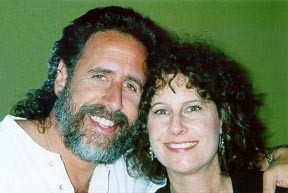
|
Woke at 9 A.M. after a sound night's sleep.
It was difficult to get out of bed. Through our large shuttered
bedroom windows I watched stray cats playing in a pile of construction
material next door. We had a quick breakfast downstairs and then
went out to taste the flavors of Venice once more before we had
to board the train to Firenze. |
|
|
Walking once again to the east of the hotel,
along the well-worn Lista di Spagna, we passed many quaint shops
and cafes, monumental churches and palaces, and crossed several
bridges over lovely cerulean canals. The absence of any motorized
vehicles is positively refreshing. Only boats' engines can be
heard above the murmur of the placid water as it caresses the
old stone walls of the canals. Every now and then we hear a gondolier
greeting another out in their shiny black boats with the characteristic
golden "ferri" prows. In 1562 it was decreed
that all gondolas should be painted black to stop people from
flaunting their wealth. These slim-hulled craft have been a familiar
part of Venice since the 11th century. The past calls out to
us at every turn. |
|
|
We saw our friends Enzo and Vincenzo inside
their trattoria once again and waved hello. We sat at a café
and had our usual acqua con gas while we people-watched.
Tasted more delightful gelato, undoubtedly the very best
ice cream in the world. We walked further along this seductive,
baroque dreamland until we found a little sunlit square with
benches. It was warm, so we decided to sit for a while. At a
nearby bench, 5 or 6 elderly Italian women were schmoozing and
we heard them talking about us. We smiled back and forth at each
other, and they soon realized that we could understand a little
of their Italiano discussions about us. We all laughed and waved
ciao and went on our way back past shop after shop. |
|
|
We bought a massive sandwich - a mountain
of olives and cheese in a strudel-like bread, and Coke and water.
We then stopped at a café to rest and started to eat our
immense sandwich. An Italian gentleman began to speak to me in
rapid Italian. When I politely stopped him and said "No
capiche," he refused to believe that I was not Italian. |
|
|
We discovered that it was time to walk to
the train station, and several minutes and steps later we realized
we had forgotten our giant sandwich and Coke and water. We hope
someone was able to enjoy them. |
|
|
At around 1:30 we retrieved our bags from
the hotel, said molte grazie e ciao to concierge Mario,
and walked the half block to the Santa Lucia ferrovia
(train station.) We saw a newly arrived tourist couple loaded
down with many, many bags and golf clubs and wondered how they
were going to get all their gear to their destination. They apparently
were also pondering this dilemma. We suggested the vaporettos
and wished them good luck, then entered the train station where
we boarded our train to Bologna. With tears in our eyes, we bid
"arrivaderci" to the Pearl of the Adriatic.
We know we will see her again, someday… |
|
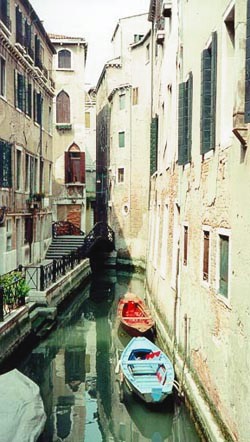 |
|
|
The short ride through the Tuscan hillsides
was warm but pleasant. We disembarked in Bologna and walked into
the station to inquire about our connection to Firenze. Two armed,
kind carabinieri guided us and we caught the train, called
The Michelangelo, no less, and were on our way to the
Renaissance city of Firenze. |
|
|
We shared a cabin with a strange older German
couple who never really acknowledged our presence. She got a
call on her cell phone as the train wound its way south towards
Firenze, through some remarkably serene and aesthetic Tuscan
countryside. |
|
|
We arrived in Firenze at about 6:30. As we
exited the train station, it quickly became apparent that something
was "happening." Helicopters were buzzing overhead,
and there were hundreds of people holding banners. The carabinieri
were present in great force. It turns out that a day earlier,
the Red Brigade had assassinated a politician in Milano, and
this was a "peaceful" Italian Communist Party demonstration
to inform everyone that they "didn't do it." It seemed
that all of Firenze had gathered to either witness or participate. |
|
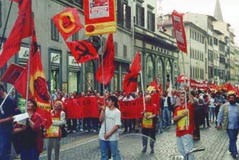 |
|
|
We quickly found our hotel, the Hotel Romagna
(Via Panzani, 4.) Lovely, sweet Eleni, our Greek/Italian concierge,
made us feel most welcome. Carol unpacked while I dashed out
into the street and up the Via de Cerretani to the immense marble
marvel, the Duomo, Cathedral of Firenze, dedicated to Santa Maria
del Fiore, where I took several photos of the exciting "demonstration."
After the "parade" passed and the crowd subsided I
went back to the room where we changed and showered. |
|
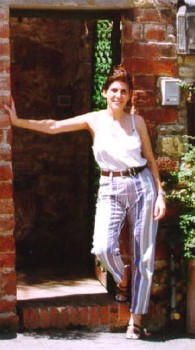 |
|
|
The Hotel Romagna is clean and ideally located
between the train station and the Duomo. Many fine restaurants,
shops and museums are nearby, as is the Mercato San Lorenzo.
Eleni and her husband Giuseppe offered many helpful tips and
guided us to several wonderful restaurants. At one point I had
to email my office on the Hotel's computer, and Eleni refused
to accept money. |
|
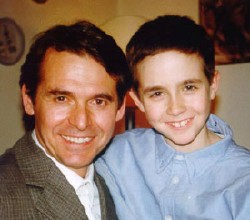 |
|
|
We decided to have dinner at Buca Lapi, a
restaurant, that Carol had "discovered" on the internet.
Eleni concurred with our decision, so we walked a few blocks
south to the unpretentious place and walked down the flight of
stairs ("buca" means "cave" in Italian)
and were promptly seated. The waiter was aloof, but helpful,
and we had a fabulous dinner of prosciutto with melon,
an Italian specialty, pasta with sausage and fennel, and the
most incredible veal with asparagus, artichokes, mushrooms and
gruyere cheese - by far the best veal we have ever tasted. We
watched the chefs at their work, pounding the veal thin with
wooden mallets and creating some very unusual and colorful dishes.
We enjoyed a bottle of the house wine, and a tasty Cuban Montecristo
and espresso for desert. The entire dinner cost about $65 U.S.,
and it was well worth every red American cent. |
|
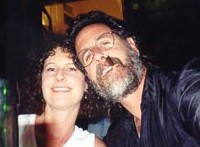 |
|
|
We then walked down several narrow winding
old streets towards the spectacular Duomo, the city's geographical
and historical focus. The nearby revolutionary 15th century bronze
Baptistry doors of Ghiberti overwhelmed Carol with emotion. It
is difficult to be in the presence of timeless art such as we
see surrounding us in this beautiful Tuscan city and not feel
emotional. Firenze is an enduring monument to the Renaissance,
the artistic and cultural reawakening of the 15th century. Dante,
Petrarch, Machiavelli, Botticelli, Donatello and Michelangelo
all called Firenze home. It seemed like we could not resist the
magnetic attraction of Ghiberti's bronze doors and their incredible
biblical bas relief panels. These doors have exerted their magic
since 1430. Michelangelo called them the "Gate of Paradise."
The heart, if it feels at all, senses the eternal combined souls
of these great writers, thinkers, sculptors, painters and scientists.
We are in the midst of one of the world's greatest artistic and
creative capitals. |
|
|
Promising each other that tomorrow we will
buy a guidebook to this incredible city full of the art of the
Masters, we walk more, past the Medici Palace, into the grand
Piazza della Signoria. For many centuries this has been the city's
political heart, and here are remarkable sculptures by Michelangelo,
Tintoretto, Donatello and others. The Fontana di Nettuno,
"Fountain of Neptune," is at the foot of the Palazzo
Vecchio and its tall bell tower. Savonarola, a religious leader,
was burned at the stake here. Near the Palazzo Vecchio is the
Uffizi, one of Italy's leading art galleries, housing works of
Urbino, Giotto, Caravaggio, Titian, Boticelli and Michelangelo.
All around us are cafes and restaurants. The evening sun has
long disappeared, and there is a mysterious green laser beam
that originates at the bell tower of the Palazzo Vecchio (tall
enough to be seen from all over Firenze) and bounces off the
reflective ball at the top of the Duomo. It is surreal. Modern
technology superimposed on the tapestry of the centuries… |
|
|
Walking back towards the hotel, we paused
in the Piazza della Repubblica where a wiry little fellow with
a beautiful dog entertained a crowd of us by eating fire and
laying on broken glass and nails. The moon was nearly full as
we made our way back to the Hotel Romagna and good night's sleep
in the cradle of the Renaissance. |
|
|
copyright 1998 / david
and carol lehrman / all rights reserved |
|
email david@davidandcarol.com |
|






